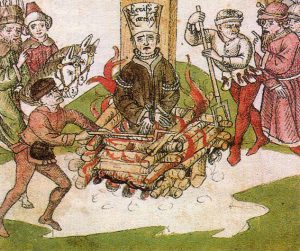Reformer Jan Hus
By Erin Naillon
Late in the 14th century, Jan Hus (also known as John Huss) made his appearance in the world – and during his lifetime, he would raise a storm of controversy that would influence the Catholic Church, several heads of state, and more than a century later, Martin Luther.
Hus’ Early Life
Hus was born in the small village of Business, outside Prague. He became a student at Prague’s Charles University, founded earlier in the same century, and earned first a Bachelor of Arts, then a Master’s degree. In the year 1400, he became a priest and, a few years later, rector of the university.
John Wycliffe
English theologian and reformer John Wycliffe (who died in 1384) had written on the subject of abuses on the part of the Catholic Church. Hus read the writings and was heavily influenced by them. He went so far as to translate Wycliffe’s Trialogus into Czech and to have it promulgated.
Preaching of Jan Hus
Hus, being a clergyman, had a perfect venue to spread his beliefs. He preached against corruption and immorality to the people of Prague. Pope Innocent VII came to hear of Hus’ rebelliousness, and on June 24, 1405, he ordered Archbishop Zbyněk Zajíc to oppose Wycliffe’s viewpoint on the Church.
The following year, two Czech students arrived from England, bearing a document with the seal of the University of Oxford. The document was a eulogy for Wycliffe, and Hus enthusiastically read it at the Bethlehem Chapel, where he preached. Two years later (1408), the new pope, Gregory XII, informed Zajíc that the Church was aware of Wycliffe’s heresy and King Wenceslas’ leniency towards Hus. The King immediately ordered that all of Wycliffe’s writings be handed over for correction. Hus complied with the royal command.
Which Pope?
The Great Schism had divided all of Europe. With two men claiming the papacy, it was difficult to know where to place one’s loyalty. Wenceslas had his eye on the title of Holy Roman Emperor (formerly held by his father, Charles IV), and thus renounced Pope Gregory XII, whom he felt would interfere with his plans. Zajíc, however, was firmly in Gregory’s corner. Wenceslas informed the university that he expected an attitude of strict neutrality toward both Gregory and the Avignon Pope, Benedict XIII.
There were four coalitions within the university, each with voting rights, and one, the “Bohemian nation”, issued a statement of neutrality. Hus headed this coalition. He and others pressed the King to give the Bohemian nation three votes, rather than one, and for the “foreign nations” to have only one vote each. The foreign nations represented Poland, Bavaria, and Saxony, and when the King agreed to the request, thousands of academics left Charles University. This decreased the importance of the university dramatically.
Heresy in Bohemia
When the academics left the university and Prague (some of them formed the University of Leipzig), they spread the word throughout Europe of Hus’ “heresy”. Hus was now well-known throughout the continent.
In 1409, the year Charles University lost so many of its members, the Council of Pisa elected Alexander I as pope in an attempt to heal the schism. Wenceslas switched sides and declared Alexander the true pope; Hus and his group did the same. Zajíc was forced by the King to follow suit; he then complained to Alexander about the problems caused by the followers of Wycliffe. On December 20 of that year, Alexander issued a papal bull authorizing Zajíc to take measures against reformation.
Zajíc took action immediately, ordering the surrender of all of Wycliffe’s books and a ban on preaching his doctrines. Hus protested to Alexander, to no avail. The antipope excommunicated Hus, and Wycliffe’s works were burned. Rioting followed. Hus ignored the prohibition on preaching the views of Wycliffe, and for some time, he got away with it; the government, at that time, was on his side. Furthermore, Zajíc died in 1411.
Crusades and Indulgences
The same year Zajíc died, antipope John XXIII started a crusade against the King of Naples, Ladislaus, who protected Gregory XII. Citizens all over Europe, including Prague, were urged to buy indulgences. Hus, of course, protested this trafficking, but without the support of his university followers. In 1412, Hus stated his views on the subject of indulgences and popes who start wars. Not long afterward, the papal bulls were burned by some of his adherents. Three men who opposed indulgences were used as a public example – they were beheaded.
The King convened a synod in Prague on February 2, 1412. It ended without results. The King, however, was determined to bring together the Church and the rebel. His brother, Sigismund, organized a council at Constance, Germany on November 1, 1414. Sigismund guaranteed that Hus would have safe passage to the council and Hus, ready to reconcile, agreed.
Hus and the Council of Constance
Hus left Bohemia on October 11, 1414. He made his will before departing. He arrived in Constance on November 3 of that year. At first, he lodged in the house of a local woman, but rumors soon spread that he planning to escape the city. He was then imprisoned in a monastery dungeon on December 8. He was later brought to a castle belonging to the Archbishop of Constance and incarcerated for 73 days – in chains, with little food.
On June 5, 1415, Hus was transferred again, to a Franciscan monastery. It was here that he would remain. His trial began that day. He started his high opinion of John Wycliffe quite clearly; the King warned him that he (the King) would not protect a heretic and that Hus should ask mercy from the Council. On June 8, several of his writings were read to him. He refused to recant.
 The Stake
The Stake
On July 6, 1415, Hus was asked once again to recant. Again, he refused. He was led to the stake by a group of armed men. Once at the execution site, he knelt and prayed.
Hus was stripped and chained by his neck to the stake, with his hands tied behind his back. At the last minute, he was asked once more to recant, and thus save his life. The answer was decidedly in the negative. The brush around the stake was set alight, and Jan Hus burned to death. Afterward, his ashes were dumped in the Rhine River.
Hussite Wars
The Hussite Wars soon broke out all over Europe, continuing on into the next century. Hus’ life and death were a profound inspiration to Martin Luther, who instigated the Protestant Reformation. Now, a statue grouping of Hus and his followers is one of the dominants of Prague’s Old Town Square, and July 6 is a holiday commemorating him.
Reform of the Czech language
Interestingly enough, Hus also had a lasting effect on the Czech language. The unusual accents used in written Czech were created by him, much to the dismay of foreigners – and more than one Czech student.




